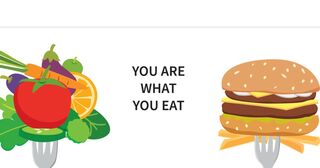Diet
Is Clean Eating Healthy?
If you want to be healthy but don't know where to start, consider these factors.
Posted April 28, 2022 Reviewed by Vanessa Lancaster
Key points
- The term “clean eating” may sound healthy, but it has all the hallmarks of a fad diet.
- Food rules, restricting, ignoring individual preferences, and hyperfocusing on certain foods–even “healthy” ones–can lead to an eating disorder.
- An unhealthy fixation on eating "healthy," orthorexia, can be treated with medical, psychological, and nutritional management.
By Gia Marson, ED.D.
The messages “you are what you eat” and “clean eating is healthy” are pervasive. And misleading.
Clean eating necessarily implies that any other form of eating – and consequently the eater of it – is dirty or impure and thus bad, and it's not simply a way of shaming and persecuting others, but leads to that self-shaming and self-persecution that is forcibly detrimental to true healthy eating.―Nigella Lawson

Recommendations about healthy eating and the popular diets that support them go through a range of fads, but they almost always have one thing in common: they center around the myth that there is one ideal weight, fitness level, and body type that all of us should aspire to.
Currently, we’re seeing a difficult-to-dispute fad: the diet mindset called “clean eating.” Unfortunately, the term “clean eating” is often treated as synonymous with “healthy eating.” But, it is not the same as healthy eating. Clean eating centers around consuming specific types of foods and a restriction on other types of foods. Not only does this trend mask disordered eating habits, but it also perpetuates a variety of unhealthy messages that may lead to an eating disorder or stall full recovery from one:
- There is one rigid “right way” or “best way” to eat.
- Healthy eating is pretty much the same for everyone.
- Labeling foods as “healthy food” and “junk food” is helpful.
- Fearing certain food groups is an enlightened perspective.
- We should feel guilty when we don’t follow “healthy” food rules, such as “clean eating.”
- We can only be physically healthy when we eat according to external guidelines.
- We are what we eat; therefore, we should hyperfocus on it.
- Individuals who eat clean have more willpower than those who don’t.
What characterizes clean eating versus healthy eating?
“Clean eating” typically refers to eating foods deemed healthy, including fresh fruits and vegetables, whole grains, and other foods that have been very minimally processed.
But used as a misnomer for “healthy,” “clean” can mean different things to different people. For some, it may mean anything gluten-free. For others, dairy-free or vegan. Moreover, hyper-focusing on inflexible “clean” beliefs about food choices, food production, and food preparation can take up time and energy.
In contrast, healthy eating is varied, flexible, and responsive to a person’s hunger and fullness cues, health needs, schedule, preferences, lifestyle, medical conditions, and food accessibility.
How can clean eating go wrong?
While some people may use clean eating as a launching pad for eating a more balanced diet, it also holds the potential to develop into a fixed dieting mindset and restrictive, rule-driven eating behaviors. When healthy eating becomes rigid, it can escalate into an eating disorder such as orthorexia nervosa, a condition defined by an unhealthy obsession with “healthy” eating.
Research tells us that symptoms of orthorexia are highly prevalent in individuals with both anorexia nervosa and bulimia nervosa and that symptoms of orthorexia may increase after treatment for an eating disorder.
Healthy eating is (usually) not rigid.
Let go of toxic control, in order to regain healthy control. ―Kayla Rose Kotecki
There is a small segment of the population for whom it makes good sense to be highly cautious and even rigid when it comes to what they eat, such as those diagnosed with type 1 diabetes or celiac disease. However, for most of us, when it comes to how we eat and think about food, all-or-nothing labels, like good/bad, right/wrong, and healthy/junk, can interfere with our health.
The truth about eating well is more responsive, flexible, individualized, and nuanced:
- Healthy eating is different for everyone.
- Hyper-focusing on food is not healthy for most of us.
- Eating a wide variety of foods often turns out to be best for creating a healthy gut biome.
- Ruminating about any one eating mindset shuts down other aspects of a full, meaningful life.
When it comes to differentiating between a preference for one way–eating whole, organic, minimally processed foods–and something more rigid and serious, it’s helpful to look at how your mindset and behaviors impact you. A good rule of thumb is that if your thoughts about eating are starting to take up a lot of time or harming your life, emotions, or social behavior, then it is time to get some professional help.
Treatment Options
Your behaviors and environment can cause changes that affect the way your genes work. Unlike genetic changes, epigenetic changes are reversible and do not change your DNA sequence, but they can change how your body reads a DNA sequence.—CDC on genetics and precision health
Clean eating comes with risks to some people based on genetics. If you have a certain type of genetic loading, maintaining a rigid diet and embracing obsessive and all-or-nothing thinking may change how your genes are expressed, turning them on or off. That explains why one person may be at risk for serious physical and mental health problems such as anorexia nervosa or bulimia nervosa- after starting to “eat clean,” while another may be less vulnerable.
While more research is needed regarding the therapeutic outcomes of treatment for the rigid mindset and behaviors of an unhealthy fixation on clean eating or orthorexia, current practice suggests that medication, psychoeducation, nutritional counseling, and therapy are effective.
Keep in mind that fads, diets, and even professionals who purport to have the answers about food that apply to everyone should be met with an abundance of caution. Last, how and what we eat does not make us moral or immoral, for how can we be “dirty eaters” if we choose a path more fitting for our lifestyle, preferences, and whole health?
References
Koven, N. S., & Abry, A. W. (2015). The clinical basis of orthorexia nervosa: emerging perspectives. Neuropsychiatric disease and treatment, 11, 385–394. https://doi.org/10.2147/NDT.S61665
Segura-Garcia, C., Ramacciotti, C., Rania, M. et al. (2015). The prevalence of orthorexia nervosa among eating disorder patients after treatment. Eating and Weight Disorders 20, 161–166. https://doi.org/10.1007/s40519-014-0171-y
Zagaria, A., Vacca, M., Cerolini, S., Ballesio, A., & Lombardo, C. (2022). Associations between orthorexia, disordered eating, and obsessive-compulsive symptoms: A systematic review and meta-analysis. The International journal of eating disorders, 55(3), 295–312. https://doi.org/10.1002/eat.23654
CDC. (2020). What is epigenetics? Centers for Disease Control and Prevention. Accessed April 24, 2022. https://www.cdc.gov/genomics/disease/epigenetics.htm




